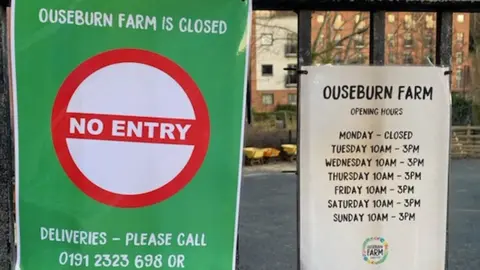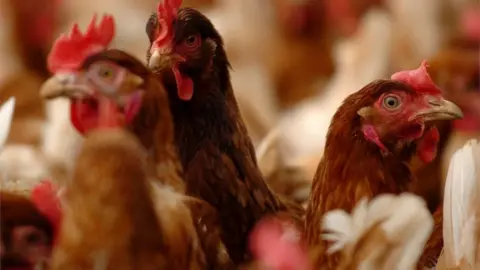Avian flu: Outbreak in Newcastle closes Ouseburn Farm
 BBC
BBCAn outbreak of avian flu has been confirmed at a community farm in Newcastle which has been forced to close its premises.
The outbreak at Ouseburn Farm near Byker was revealed on Tuesday by the Department for the Environment, Food and Rural Affairs (Defra).
It said all poultry at the site would be humanely culled.
A 1.9-mile (3km) protection zone and a 6.2-mile (10km) surveillance zone have been established around the premises.
It is the latest in a series of outbreaks of the H5N1 strain of avian influenza in birds across the UK, with about 70 different cases so far.
Ouseburn Farm is a charity and working community farm in the heart of Newcastle.
The Animal and Plant Health Agency (APHA) visited the farm on Sunday to perform tests after staff became concerned about the health of the flock.
'Increased risk'
The charity said in a statement it followed precautions to protect its poultry, keeping the birds indoors and following strict biosecurity measures.
"Unfortunately, no measures offer 100% protection and our location next to the Ouseburn River presented an increased risk, with the movement of wild birds and mammals that carry the disease, the suspected source of infection," it said.

It was "with sadness", it said, that the farm, which sees about 36,000 visitors a year, will be "closed until further notice".
"We are now working closely with Defra to follow government advice for infected premises, and will open again to you all as soon as we can," the statement added.
The charity also reiterated advice from the UK Health Security Agency that avian flu is primarily a disease of birds and the "risk to the general public's health is very low".
 PA Media
PA MediaIt is rare for avian flu to pass from birds to humans, typically requiring close, prolonged contact. Human-to-human transmission of bird flu is very rare.
Anyone who finds dead birds is advised not to touch them and to report it to Defra.
An Avian Influenza Prevention Zone is currently in place cross the whole of Great Britain to mitigate the risk of the disease spreading among poultry and captive birds.

Follow BBC North East & Cumbria on Twitter, Facebook and Instagram. Send your story ideas to [email protected].
